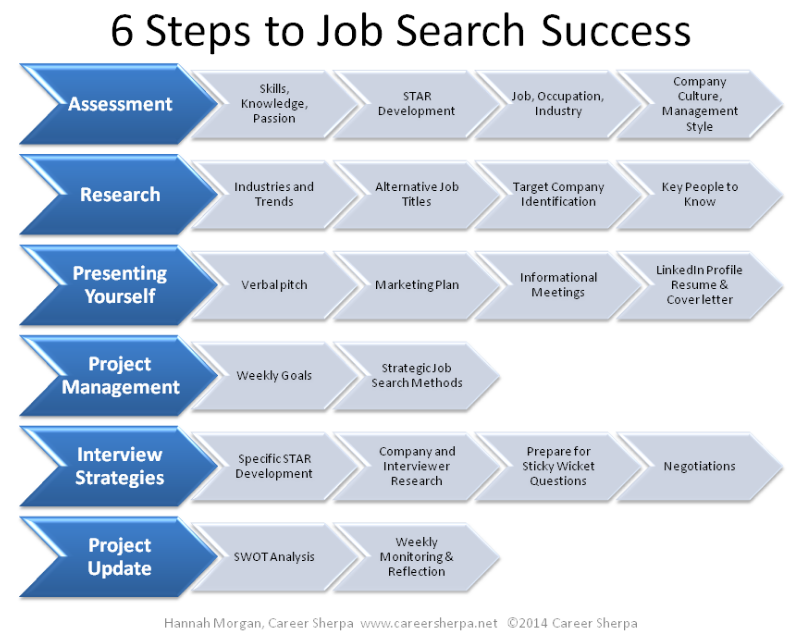The fourth step of Hannah Morgan’s six step job search strategy is Project Management. This is what most people skip to, without building the foundation that you have built since you’ve gone through the first three steps. When you think of a job search, tactics you do in job search project management are typically what you think of. This is what a job search “looks like.” Knowing what you know now (from the first three steps) can you see why jumping straight here is a mistake? In this step there are two parts:
Weekly Goals: At one job club I went to they asked for metrics, like number of people talked to each day, number of interviews, etc. State unemployment insurance typically pays based on whether or not you are doing things that are measurable, each week. Some of those metrics are lame, some of them are too soft. You know how much time you can spend on your job search… what metrics make the most sense for you? My metrics would be heavy on the number of informational interviews, and very light on the number postings I apply to. Very light.
Strategic Job Search Methods: These are the tactics… this is going to job clubs and network meetings. This is calling people on the phone and having conversations or leaving voicemail messages. This is spending time on LinkedIn to find and communicate with the right contacts, but then getting out and not letting LinkedIn be a time sink. These methods are focused and purposeful, with the end result of getting closer and closer to a job. That means having the right contacts with the right people, while conveying the right brand. This doesn’t NOT mean busy work, or just going through the motions.
The result of this step is action and metrics. You will do things, talk to people, make phone calls, follow-up, have meetings and interviews… you’ll feel busy, you’ll feel exhausted, and many times you’ll feel out of your comfort zone. But at the end of the day you’ll know you put in a good, honest effort, doing the right things, and making progress. Get a job today? Perhaps not, but you did expand your network with the right people, and you have nurtured (read: progressed) professional relationships. Do this stuff right and you’ll probably start having a lot of fun!
Job Search Project Management
Project management is project management. Job search project management uses the same principles as regular project management, but the purpose is to help you stay organized, which is critical to every job seeker. When you are organized, because of effective project management, recruiters and hiring managers, even people you network with, get a sense that you are actually and really interested in opportunities they’ve told you about. I’ve heard recruiters ask if candidates actually cared about opportunities because the job seeker had forgotten what job or company they had applied to. This is easy to do when you are trying to remember a lot of details that accumulate in your job search.
Project Management Is Tactical
Focus on the logical, linear, unemotional tasks you need to do, manage, follow-up on, etc. By the time you put together your project management system (might I suggest JibberJobber?) you’ll be focused and have a clear direction. Your project management system might not matter on day one or two or three, but once you get moving on your job search and do a lot of networking you’ll find your project management system indispensable.


1 thought on “Job Search Strategy: Effective Project Management (4)”
Comments are closed.